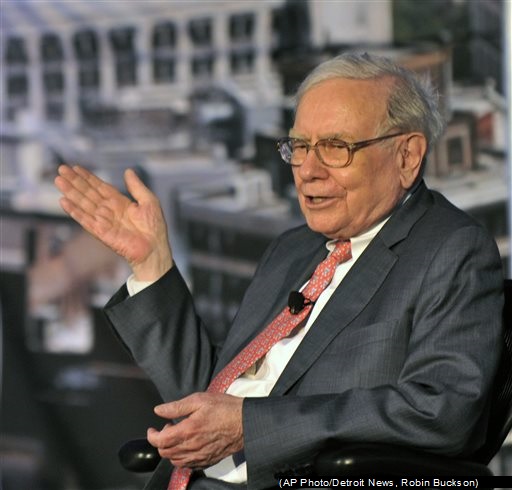Warren Buffett said last year that Berkshire Hathaway Inc.’s future will be about buying big businesses and expanding them over time. As he celebrates his golden anniversary running the company, investors are rallying behind the idea.
Shares of the Omaha, Nebraska-based company, which he took over in 1965, are trading close to an all-time high after climbing more than twice as much as the Standard & Poor’s 500 Index last year. They soared even as Buffett lost money on stakes in Tesco Plc and International Business Machines Corp., one of his biggest holdings.
Not too long ago, Berkshire was seen as a way to buy into the billionaire’s skill picking stocks. These days, it’s primarily a bet on his ability to make acquisitions and distribute funds among the dozens of businesses he bought over the past five decades, including electric utilities, manufacturers, retailers and one of the largest U.S. railroads.
“The market’s realizing that it’s more than just that stock portfolio,” said David Rolfe, who oversees about $10.5 billion including Berkshire shares at Wedgewood Partners Inc.
The recent outperformance will help Buffett, 84, make the case for why Berkshire should hang together once he’s no longer chairman and chief executive officer. He has promised to chart his vision for the company’s next 50 years in his annual letter to shareholders in February.
Part of that argument rests on a transition that’s already under way. Most of Berkshire’s stocks and bonds are held at insurance units like Geico and National Indemnity. Income from those investments accounted for about a sixth of its $15.7 billion in profit during the first nine months of 2014. Fifteen years earlier, the holdings contributed more than 80 percent of the company’s net income.
‘Huge Mistake’
That shift softens the blow when Buffett’s stock picks sour. Tesco ended 2014 down 43 percent after the Cheshunt, England-based grocer cut profit estimates multiple times. Buffett booked a $678 million impairment on the holding in the third quarter and called the investment a “huge mistake.”
Berkshire’s $11.4 billion IBM investment also hurt the portfolio. The computer-services firm ended 2014 down 14 percent — and below what Buffett paid for the shares — after saying it wouldn’t meet a five-year profit goal.
As those investments faltered, Berkshire continued its ascent. The Class A shares climbed past $200,000 for the first time in August, and ended the year up 27 percent. The $367 billion market capitalization is the fourth-biggest in the world behind Microsoft Corp., Exxon Mobil Corp. and No. 1 Apple Inc.
Berkshire rose even faster than Wells Fargo & Co., the largest holding in Buffett’s stock portfolio. The San Francisco- based bank surged 21 percent in 2014.
Generating Profits
More importantly, Berkshire’s businesses continued to make money. The railroad, BNSF, eked out an increase in earnings in the first nine months of 2014 even after struggling with service delays.Insurance operations posted underwriting profits, and earnings at the energy unit rose in part because it acquired a utility in Nevada in 2013. Manufacturing, service and retail businesses generated higher income, as well.
“It’s a wonderful portfolio of companies that was incredibly undervalued,” said Bill Smead, who oversees about $1.1 billion including Berkshire shares at Smead Capital Management. A lot of the positive trends like BNSF’s profits from hauling oil “had not been reflected in the stock a year and two years ago.”
Berkshire trades at more than 1.5 times book value, a measure of assets minus liabilities that Buffett has used for years as a yardstick of his performance. Two years ago, shares were closer to 1.2 times that gauge, the company’s threshold for buying back stock.
Cash Accumulates
Profit at the operating businesses meant cash piled up faster than Buffett could spend it. The company had a record $62.4 billion in its coffers at the end of September.
Buffett calls his biggest deals “elephants,” and they were hard to come by in 2014. Still, Berkshire and its subsidiaries agreed to a number of smaller transactions. The energy unit bought an electric-transmission business in Canada for about $2.7 billion and Buffett struck a deal in October to acquire Van Tuyl Group, the largest private network of auto dealerships in the U.S. He also provided $3 billion in financing for Burger King Worldwide Inc.’s takeover of Tim Hortons Inc.
Some of the larger acquisitions last year didn’t cut into the cash pile, because Buffett swapped stock holdings for businesses. That was the case for a company he purchased from Phillips 66 in February that makes polymers to reduce drag in pipelines. He also agreed to buy a TV station from Graham Holdings Co., the former publisher of the Washington Post, and battery maker Duracell from Procter & Gamble Co. using stock.
Investors give Buffett latitude to hold so much cash because he’s proven he can spend it wisely, said Cliff Gallant, an analyst at Nomura Holdings Inc. Berkshire’s size and reputation also mean he gets to look at deals that others don’t.
“It’d be irrational to think I can do better than him,” said Gallant. “Cash is more valuable in his hand than mine.”





















 AI Claim Assistant Now Taking Auto Damage Claims Calls at Travelers
AI Claim Assistant Now Taking Auto Damage Claims Calls at Travelers  Large Scale Cargo Ring Busted in LA, $5M Recovered
Large Scale Cargo Ring Busted in LA, $5M Recovered  Premium Slowdown, Inflation Factors to Lead to Higher P/C Combined Ratio: AM Best
Premium Slowdown, Inflation Factors to Lead to Higher P/C Combined Ratio: AM Best  Machine Learning for Mutuals: What’s Working, What’s Not, and What’s Next
Machine Learning for Mutuals: What’s Working, What’s Not, and What’s Next 






